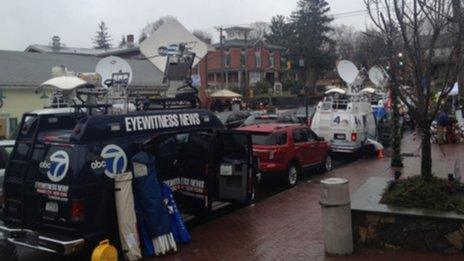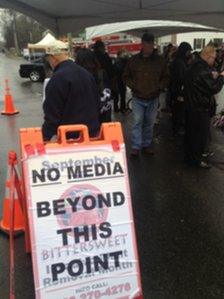Newtown overwhelmed by media
- Published
- comments

News trucks line the streets near Sandy Hook Elementary
"Go home, please, go home, all of you."
The man standing in front of me in the lobby of my hotel was not in the slightest bit aggressive, but he was very clear.
"It's unbearable. What do you all want? I know four or five of the families who lost kids and it's too much for them, with all the media here. What do you all want?"
Most of the rest of the lobby - and much of the hotel - was taken up by notebook-wielding, fleece-wearing, camera-toting journalists. But that's just the start.
The village of Sandy Hook, the centre of which is little more than a crossroads, has been transformed.
A changed town
It seems like a nice place - a classic little New England village, with white wooden houses and good-looking shops.
But it is difficult to know what it is actually like because, early on Saturday, it had been transformed into a set, a backdrop for the vast swarm of journalists that had descended on the place.
The main street, Church Hill Road, that leads towards Sandy Hook Elementary school, was grinding with bumper-to-bumper cars that it is difficult to imagine are there every - or any - day.
In the small car park in front of the Methodist church, satellite trucks belted out noise and exhaust fumes; up and down the street cameramen roamed, filming the traffic, filming the shops, filming each other.
At the bottom of Church Hill Road, where the hill begins to climb up toward the firehouse and the school, there were more satellite trucks and live positions for television correspondents.
On Saturday a few shops had pinned notices to their doors, and one or two lampposts had messages of sorrow and condolence.
Today, a shrine of candles and teddy bears and messages attracts a steady flow of visitors, many filmed and interviewed by the omnipresent camera crews.
Up by the firehouse, by the sign for Sandy Hook Elementary School ("Visitors Welcome"), there are more TV live positions.
In the overflow area are dozens and dozens and dozens more satellite vans.
Media footprint
Normally we journalists are the ones pressing our noses to the glass, reporting on what we see. Here it is the residents of the town who, driving very slowly in the staggering traffic jam look on, amazed at the freak show that has descended.

I have covered stories for 15 years in the field, some of the biggest, and have never seen anything like this, nor felt so uncomfortable about being part of it.
There are hundreds upon hundreds of journalists here, all of us searching for a new angle on a story that, really, came and went in a few terrible minutes on Friday morning.
How much more is there to say about such horror?
Perhaps not much.
On Saturday, in the space of 10 maybe 15 minutes, whilst I tried vainly to persuade members of a Newtown women's club to do an interview, I saw a placard-carrying woman by the roadside approached, filmed, photographed by more than a dozen different cameramen and journalists.
For good or ill, I do understand the machinery of news. The BBC alone has four 24-hour news channels (two radio, two TV, one each respectively for domestic and international audiences) along with three TV news bulletins a day, four radio news programmes most days, radio news bulletins, summaries and our online operation.
None of these outlets is catered for without correspondents and producers, cameramen and technicians.
Throw in ITN, Sky, Channel 4 and the newspapers - one broadsheet sent four correspondents - and British outlets alone must have sent 100 people to this tiny place.
And the American networks and cable new channels must each have sent dozens of staff here, for their news bulletins and their programmes; CNN has rolled from Newtown pretty much non-stop since the massacre. On the networks, programme after programme has been anchored from the town.
There's no denying that this is an astonishing event that audiences want to know about.
But our footprint in tiny Sandy Hook is exceptionally heavy. And after a while, you have to wonder what more there is to say.
The children have gone. Their poor parents are grieving. The police are saying very little.
Some reporting comes close to repeatedly ripping a sticking plaster off. Watch or listen or read too much, and it feels as if we are wallowing in other people's pain.
Go home, the man in the lobby said, go home. And very soon, I will.
UPDATE: Jonny Dymond left Newtown on the night of 17 December, shortly after posting this blog.